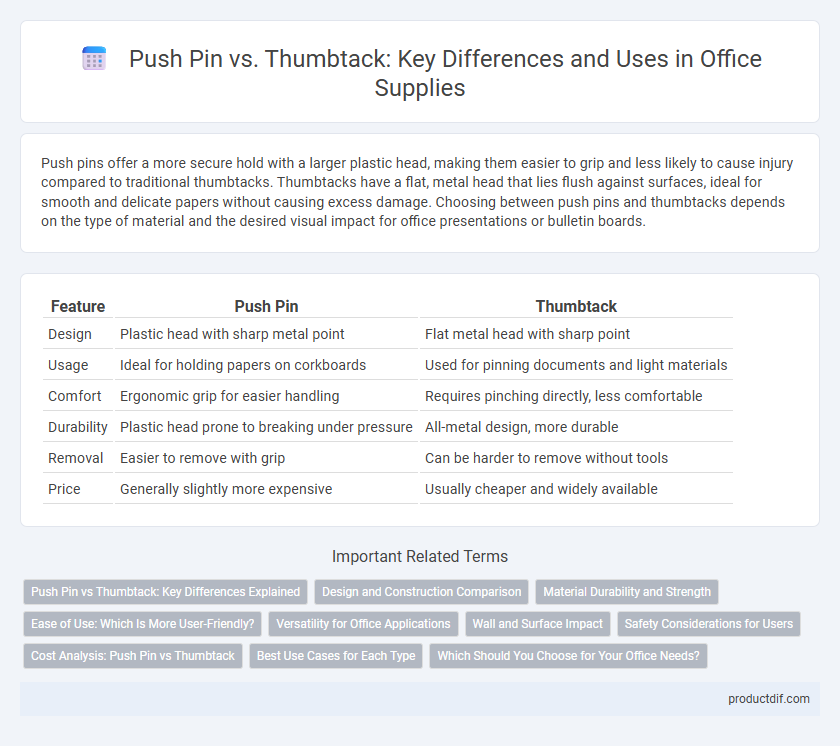Push pins offer a more secure hold with a larger plastic head, making them easier to grip and less likely to cause injury compared to traditional thumbtacks. Thumbtacks have a flat, metal head that lies flush against surfaces, ideal for smooth and delicate papers without causing excess damage. Choosing between push pins and thumbtacks depends on the type of material and the desired visual impact for office presentations or bulletin boards.
Table of Comparison
| Feature | Push Pin | Thumbtack |
|---|---|---|
| Design | Plastic head with sharp metal point | Flat metal head with sharp point |
| Usage | Ideal for holding papers on corkboards | Used for pinning documents and light materials |
| Comfort | Ergonomic grip for easier handling | Requires pinching directly, less comfortable |
| Durability | Plastic head prone to breaking under pressure | All-metal design, more durable |
| Removal | Easier to remove with grip | Can be harder to remove without tools |
| Price | Generally slightly more expensive | Usually cheaper and widely available |
Push Pin vs Thumbtack: Key Differences Explained
Push pins feature a plastic or metal head with a sharp metal point, allowing easy insertion and removal from bulletin boards, ideal for frequently changed displays. Thumbtacks typically have a flat, round metal head and are designed for more permanent attachment to surfaces like corkboards or walls, offering a lower profile but less convenience in repositioning. The choice between push pins and thumbtacks depends on the need for reusability, visibility, and surface compatibility in office supply applications.
Design and Construction Comparison
Push pins feature a plastic or metal head with a sharp metal point designed for easy insertion and removal, while thumbtacks have a flat, circular metal head that lies flush against surfaces for a secure hold. The ergonomic design of push pins enhances grip and reduces finger strain, making them ideal for repeated use, whereas thumbtacks provide a minimalist profile suited for temporary or permanent fastening. Both types use durable steel points, but push pins often incorporate molded plastic components for added comfort and visibility in office settings.
Material Durability and Strength
Push pins are typically made from durable plastic heads combined with steel pins, offering superior strength and resistance to bending compared to thumbtacks. Thumbtacks often feature metal heads that can deform under pressure, making them less durable for frequent use or heavy materials. The steel pin in push pins ensures enhanced durability and reliable hold on various surfaces, making them ideal for long-term office display needs.
Ease of Use: Which Is More User-Friendly?
Push pins offer a more ergonomic grip with their larger heads, making them easier to handle and less likely to cause finger discomfort during extended use. Thumbtacks, with their flat heads, require more precision and can be more challenging to push in without a tool or fingernail assistance. For quick, repetitive tasks such as pinning documents or notices, push pins are generally considered more user-friendly due to their superior ease of use and reduced risk of accidental pricks.
Versatility for Office Applications
Push pins offer greater versatility for office applications due to their larger grip area and stronger hold, making them suitable for pinning heavier documents or securing items on various surfaces like corkboards and fabric panels. Thumbtacks, while compact and easy to use, are best for lightweight papers and may struggle with thicker materials or repetitive use on harder surfaces. Selecting push pins enhances efficiency and durability in office tasks, supporting a wider range of organizational needs.
Wall and Surface Impact
Push pins exert less pressure on walls due to their slender design, minimizing damage to drywall and painted surfaces compared to thumbtacks, which have a broader, flatter head that distributes force unevenly and can leave larger holes or marks. Thumbtacks are better suited for tougher surfaces like corkboards or wooden panels where their flat heads provide stability, but they may cause dents or surface deformation on more delicate walls. Choosing between push pins and thumbtacks depends heavily on the wall material and desired preservation of surface integrity.
Safety Considerations for Users
Push pins feature a plastic or metal head that reduces the risk of accidental pricks, making them safer for environments with children or frequent handling. Thumbtacks have a flat metal head that offers less grip and protection, increasing the chance of injury when pressed or removed. Choosing push pins over thumbtacks enhances user safety by minimizing sharp exposure and improving secure handling.
Cost Analysis: Push Pin vs Thumbtack
Push pins typically cost more than thumbtacks due to their plastic or metal heads and ergonomic design, providing easier handling and reusability. Thumbtacks are generally cheaper, made with simple metal heads, making them an economical choice for short-term or infrequent use. When evaluating cost-effectiveness, push pins offer better value for frequent use or heavier materials, while thumbtacks suit low-budget, occasional tasks.
Best Use Cases for Each Type
Push pins are ideal for securely attaching papers or lightweight materials to corkboards without causing significant damage, making them perfect for offices and classrooms. Thumbtacks, with their flat heads and sharp points, work best for pinning fabric, bulletin boards, or heavier items where a flush surface is needed. Selecting between push pins and thumbtacks depends on the material being pinned and the desired hold strength.
Which Should You Choose for Your Office Needs?
Push pins offer a larger grip and colorful heads, making them ideal for frequently updated office bulletins or visual displays. Thumbtacks provide a flatter profile, which is perfect for a cleaner look and securing papers without bulky protrusions. Choose push pins for ease of use and vibrant visibility or thumbtacks for minimalistic, low-profile pinning in your office space.
Push Pin vs Thumbtack Infographic

 productdif.com
productdif.com